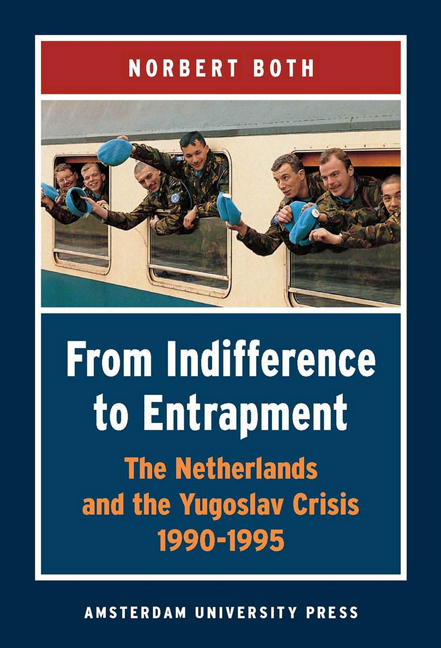Book contents
- Frontmatter
- Dedication
- Contents
- Preface
- Abbreviations
- Chronology
- Introduction
- 1 The Netherlands and its Foreign Policy System
- 2 An Emerging Challenge, July 1990 - June 1991
- 3 From ‘Even-Handedness’ to ‘Selectiveness’, July -December 1991
- 4 Moral and Political Entrapment: The Netherlands and International Peace Plans for Bosnia, 1992-1994
- 5 Military Entrapment: The Commitment to Srebrenica
- Conclusion
- Bibliography
- Index of Names
1 - The Netherlands and its Foreign Policy System
Published online by Cambridge University Press: 14 January 2021
- Frontmatter
- Dedication
- Contents
- Preface
- Abbreviations
- Chronology
- Introduction
- 1 The Netherlands and its Foreign Policy System
- 2 An Emerging Challenge, July 1990 - June 1991
- 3 From ‘Even-Handedness’ to ‘Selectiveness’, July -December 1991
- 4 Moral and Political Entrapment: The Netherlands and International Peace Plans for Bosnia, 1992-1994
- 5 Military Entrapment: The Commitment to Srebrenica
- Conclusion
- Bibliography
- Index of Names
Summary
Located in Northwestern Europe, the Netherlands has a population of around 16 million people, squeezed into a territory of only 41,526 square kilometres. The country's origins as a political entity can be found in the sixteenth century. In 1568 a revolt led by William of Orange started in the ‘Low Countries’ against Habsburg Spain, which, after an eighty year war resulted in the recognition of the independence of the Northern part as the Republic of the Seven United Netherlands at the Treaty of Westphalia. The Southern part (presentday Belgium) remained under Habsburg rule. These seven provinces, with Holland and Zeeland as the predominant powers, had by then become a formidable maritime power with strongholds in, for instance, modern-day Indonesia, South India, South Malaysia, Sri Lanka, South Africa, Brazil, New York as well as dominating trade on the Baltic sea. The seventeenth century is known as the ‘golden age’ of Dutch history, famous for its cultural achievements and economic prosperity. The eighteenth century was a period of stagnation for the Netherlands, as well as being under French influence from 1795 to 1813. Meanwhile, the colonial empire was taken over by the British and only partly restored after 1813. After Napoleon was defeated, the House of Orange was restored and the Northern and Southern Netherlands (Belgium) were united in the Kingdom of the Netherlands. The Belgian revolution of 1830 brought a quick end to this new state and resulted in the formation of the Kingdom of Belgium in 1831. During the First World War, the Netherlands’ neutral status was respected. At the beginning of the Second World War, the Netherlands again declared itself neutral, but this time it was not respected. In May 1940, the country was overrun by Nazi Germany in five days. The defeat was followed by five years of occupation that saw most of the Dutch Jewish population exterminated in concentration camps.
The Nazi occupation together with the extermination of the Jewish population still constitutes one of the two most influential experiences for contemporary Dutch society. The other one was the ‘loss’ of Indonesia. Much of post-war Dutch foreign policy can be understood as a quest for compensation for the loss of status as a maritime and colonial power.
- Type
- Chapter
- Information
- From Indifference to EntrapmentThe Netherlands and the Yugoslav Crisis, 1990–1995, pp. 45 - 68Publisher: Amsterdam University PressPrint publication year: 2012



